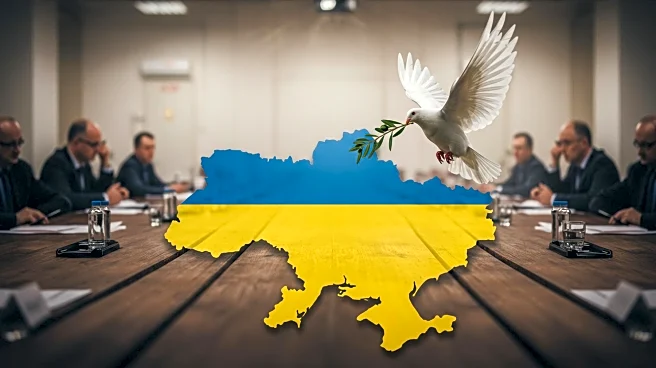What is the story about?
What's Happening?
Following the Alaska summit between President Trump and Russian President Vladimir Putin, President Trump has shifted his stance on the Ukraine conflict, advocating for a direct peace agreement rather than a temporary ceasefire. This development comes after Trump held calls with Ukrainian President Volodymyr Zelensky and NATO leaders. Trump announced on his social media platform, Truth Social, that there is consensus among the leaders that a direct peace agreement is the optimal solution to end the war. Additionally, Trump confirmed that Zelensky is scheduled to visit Washington DC for talks, with a potential meeting with Putin to follow if conditions are favorable.
Why It's Important?
The shift in President Trump's position on the Ukraine conflict could have significant implications for international diplomacy and the ongoing war. A direct peace agreement, as opposed to a ceasefire, suggests a more permanent resolution, which could stabilize the region and potentially reduce tensions between Russia and Western nations. This approach may also influence U.S. foreign policy and its relations with European allies, who have expressed readiness to work towards a trilateral agreement. The outcome of these discussions could impact global security and economic conditions, particularly in Europe.
What's Next?
President Zelensky's upcoming visit to Washington DC is a critical next step in the diplomatic process. The potential meeting between Trump and Putin, contingent on successful talks with Zelensky, could further shape the trajectory of the conflict resolution. European leaders have expressed their willingness to engage in trilateral discussions, which may lead to a comprehensive agreement involving Ukraine, Russia, and NATO countries. The international community will be closely monitoring these developments, as they could redefine geopolitical alliances and strategies.
Beyond the Headlines
The emphasis on a direct peace agreement raises questions about the long-term implications for Ukraine's sovereignty and territorial integrity. Ethical considerations regarding the enforcement of such an agreement and the role of sanctions against Russia are likely to be debated. Additionally, the diplomatic dynamics between the U.S., Russia, and European nations may experience shifts, influencing future international relations and security policies.















